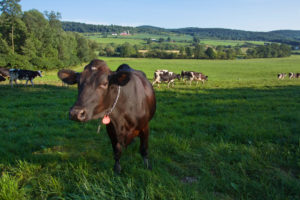Beefing Up the Dairy Industry: New Research Offers Guidance on Beef Crossbreeding

Raising dairy calves to a feed weight can create another income stream for farmers.
Robert Barker / Cornell UREL
Farmers may now be better equipped to decide if a beef cross-breeding enterprise would be a good addition to their dairy business, thanks to new research from Cornell University Beef Extension Specialist Mike Baker.
Baker’s research has found that Expected Progeny Difference (EPD) data points can help dairy farmers make a good-fit beef breed bull selection for their milk cows.
Right now, many of the calves being born in New York are being raised to a feed weight outside of the state. But according to Baker, New York dairy farmers might be missing out on an opportunity to receive a higher price for these calves, especially if they are crossbred with a beef breed.
“Given the abundant supply of high-quality forage in Northern New York, producers have the potential to raise calves to feeder weights of 300 to 800 pounds, or to finish them using feed refusals from their dairy enterprise,” Baker told the Northern New York Agricultural Program (NNYADP). “This can provide an additional income stream for dairies as well as a supply of calves for the burgeoning beef stocker industry.”
According to Baker, Holstein-beef crossbred bull calves can bring a much higher price than their purebred counterparts at auction — up to $100 per head. This added income can be a welcome boost for dairy farmers.
“Holstein cows should be bred to beef sires whose traits complement the cows’ genetic makeup, are economically-competitive to feed, and meet consumer demands for beef quality,” Baker summarizes.
Read more about the research on the NNYADP website.

